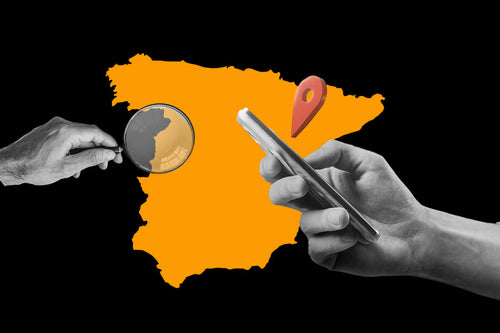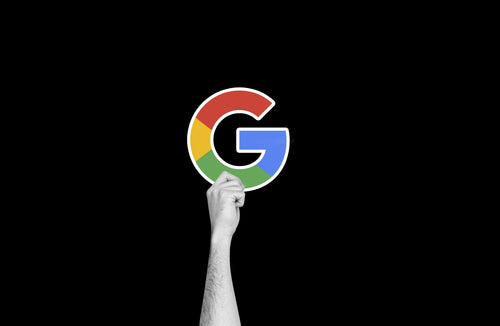You probably already know how important it is to appear on Google if you offer services or sell products through your website. Reaching position one in organic (non-paid) results is the dream of any brand or business, but not everything is possible to achieve it.
Thus, some SEO experts are led astray by the dark side of this discipline , resorting to certain unethical or unethical techniques to position a website on the first page of Google. This is what is known as Black Hat SEO , and it encompasses a whole series of tempting yet very dangerous actions: the positioning achieved with these practices is rapid, but Google will eventually detect these practices and severely penalize the website, even going so far as to remove it from its index.
That's why, here we explain what Black Hat SEO is, what techniques it includes, and what consequences it can have , so you can stay away from anyone who suggests it for your website.
What is Black Hat SEO?
As we've said, Black Hat SEO encompasses all those techniques that seek to manipulate Google's algorithms to improve web positioning in an unnatural way and, above all, against the search engine's guidelines.
Unlike traditional SEO (known as white hat SEO), black hat SEO doesn't put the user at the center, something that's increasingly important for Google. Rather, its sole objective is to trick search engines into ranking higher , regardless of whether the content is useful or the browsing experience is good. These tactics may work in the short term, but sooner or later Google will detect them .
The result? Penalties, loss of traffic, or, in the worst case, the complete disappearance of your website from the search engine index.
Why is it called Black Hat SEO?
The term "black hat" comes from classic Western films, where villains often wore black hats . In contrast, heroes wore white hats. The universally used analogy of black and white men facing off was also adopted in the SEO world to differentiate "bad" (black hat) practices from "good" (white hat) ones.
Main Black Hat SEO techniques
Contrary to what some people think, you don't have to be a hacker to do Black Hat SEO , although some practices do require technical knowledge.
Many of these techniques may seem harmless or even "clever," but using any of them can backfire. The most common Black Hat SEO actions are the following . We repeat: you should be aware of them to steer clear of their siren calls.
1. Keyword stuffing
Although Google is increasingly oriented towards search intent rather than a “traditional” keyword, keyword stuffing consists of excessively repeating a keyword within the content, with the intention of positioning it .
For example, if you're trying to rank for "white sneakers" and you write: "If you're looking for white sneakers, our white sneakers are the best white sneakers on the market because our white sneakers are comfortable and affordable." As you can see, this type of writing sounds robotic, artificial, and jarring, since it's written for search engine robots, not users .
However, Google has made great progress in natural language processing (and even more so with AI), and it easily detects these practices.
What can you do instead? Based on our SEO experience, you should stop obsessing over keywords and focus on creating original content that's meant to be read by users . This way, you'll use synonyms and keyword variations naturally, which is precisely what Google rewards.
2. Hidden text for users
This black hat technique, closely related to the previous one, consists of setting the text to the same color as the page background or adding it as a font size of 0. The goal is to hide the text from the user, allowing for covert keyword stuffing . This way, you could have visible text written for the user and "hidden" text that crawlers can still detect.
Like keyword stuffing , Google penalizes this practice, first, for saturating the website with keywords and, second, for hiding content from the user. Our advice: never hide anything on your website; everything should be clearly visible to users .
3. Cloaking
Cloaking is a technique in which different content is shown to the user than to the Google bot . That is, when Google visits your page, it sees an SEO-optimized version; but when a human visits, it sees a completely different version. This can be done, for example, to trick Google into thinking the page is about a highly searched topic, when in reality, it has nothing to do with it .
Cloaking , an action that is more technical and less about content, is serious because it directly undermines transparency , and Google severely penalizes those who try to manipulate it in this way.

4. Doorway pages
Doorway pages are pages created specifically to rank for certain keywords, but which don't actually contain any useful content .
Its sole purpose is to automatically redirect the user to another page, without their consent . Imagine clicking on a page that promises "better mobile deals" and, upon arrival, it redirects you to another generic or semantically unrelated website.
When faced with this Black Hat SEO technique, Google considers you to be deceiving the user (in fact, you are) , and that goes against its principles. These pages provide no real value and end up penalized.
5. Bulk purchase of links
Backlinks (links from other websites to yours) are one of the most important factors for SEO. But not all links are equal.
For years, SEOs specializing in backlinks have been obsessed with buying links—the more, the better . And this doesn't matter if they were links from low-quality websites, link farms, or sites completely unrelated to the one they wanted to rank. However, if your links come from suspicious sites or are clearly purchased, you could suffer a manual penalty. And not just a penalty for the specific URL you want to rank, but for your entire domain!
Be careful, we're not saying you shouldn't work on backlinks —far from it. But your link strategy should be aimed at acquiring these links naturally , which means they should be distributed over time and come from semantically related websites, among other things.
Acquiring a lot of links in a short period of time , especially if your website is new, can give Google the impression that you're buying links willy-nilly, and you'll end up getting penalized.
6. Duplicate or copied content
Copying content from other websites without permission or without adding anything new is another common Black Hat SEO technique . Some even duplicate their own content on different pages with slight changes in an attempt to rank faster.
But Google rewards original and valuable content. Duplicate content can cause your website to not be indexed correctly or cause the original site to be prioritized . Instead, you should create unique, authentic, well-written content that addresses your audience's real questions (search intent).
With this White Hat SEO practice, your content will be a good candidate to appear in Google's AI Overviews , a feature that the search engine has recently implemented.
What are the consequences of using Black Hat SEO?
As we have been saying up until now, although it may seem like a fast track to the top positions on Google, Black Hat SEO always ends up having negative consequences for your website , some more serious than others, such as:
Once penalized, recovering your rankings is very difficult and can take months of constant effort. Sometimes, it's even impossible to achieve, leaving you with no choice but to abandon your website and dedicate yourself to working on a new one from scratch.
Black Hat and Negative SEO
Speaking of unethical practices in the SEO world, some go even further into the shadows and resort to Black Hat SEO not to position their clients' websites: they do it to sink their competition .
Assuming (of course) that they can't make changes to your competitors' websites, a negative SEO attack consists of sending hundreds or thousands of poor-quality backlinks to the websites you want Google to penalize , so you can always appear above them.
Fortunately, there are SEO tools that can detect these toxic links and then send them to Google's own disavow link tool.
Additionally, if you suspect a website is being ranked using poor practices or violating any of Google's guidelines, you can also report it using the search engine's spam, phishing, or malware reporting tool .

White Hat SEO: Safe and Sustainable SEO
As you might have guessed, white hat SEO is the exact opposite of black hat SEO. It's a set of ethical techniques that follow Google's guidelines , which, while the results aren't generally immediate, are long-lasting . Think of it this way:
Black Hat SEO is like building a house hastily, with poor materials and without technical supervision. By doing so, the house will be ready to move into in record time, but sooner or later, the whole building will collapse.
White Hat SEO, on the other hand, consists of building the house little by little, with quality materials and always with the help of a good architect. It will take much longer to finish, yes, but its foundations and structure will be so solid that nothing will be able to knock it down. By this, we mean that White Hat SEO is based, among other things, on :
Google is getting smarter all the time, and what it hates most in the world is being tricked . So, use good techniques when building your house: the time invested in doing things right will be worth it. Trust us.
We help you do good SEO
Are you already convinced you want to use white hat SEO to position your brand at the top of Google's search results? At our SEO agency, we can help you with that, starting with a free, no-obligation SEO quote. Just fill out the form, tell us about your project... and we'll make Google fall in love with your website.




 https://maktagg.com/blogs/blog-marketing-digital
https://maktagg.com/blogs/blog-marketing-digital










